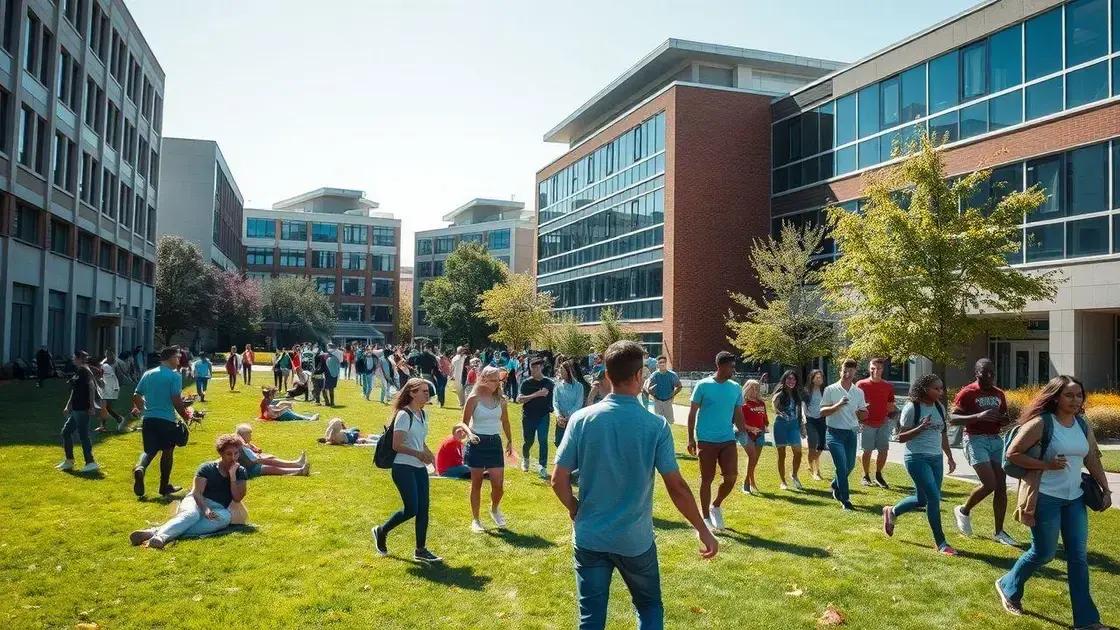To Students Coming to America: Are Indian Realities Different?

To students coming to America, adapting to lifestyle and culture involves engaging in local communities, respecting customs, and building social networks through clubs and events.
To students coming to America, navigating a new culture can be both exciting and overwhelming. Have you ever wondered how Indian realities shape this experience? Join us as we unpack key insights.
Cultural differences: What Indian students should know
Cultural differences can greatly affect the experience of Indian students coming to America. Understanding these differences is crucial for adapting successfully. In this section, we’ll explore key cultural aspects that can help you navigate your new surroundings with ease.
Individualism vs. Collectivism
One of the most significant differences is the value placed on individualism in America compared to collectivism in India. In American culture, personal achievements and independence are highly regarded. Students should be aware that this emphasis on individualism can influence everything from classroom participation to social interactions.
Communication Styles
Communication can also differ significantly. Americans tend to be more direct in their speech, which can sometimes be perceived as rude by those accustomed to Indian communication styles that emphasize indirectness and politeness. Understanding this can help you engage more effectively with peers and professors.
Classroom Dynamics
The classroom environment in the U.S. is often less formal than in India. Students are encouraged to express their opinions and ask questions. Here are some tips to adjust:
- Participate actively in discussions.
- Feel free to approach teachers for help.
- Collaborate on group projects with classmates.
- Be open to diverse perspectives.
American culture also values timeliness. Punctuality is seen as a sign of respect, so being on time for classes and meetings is important. This expectation may be different from what many students are used to in India, where flexibility with time can be more common.
In addition, embracing the casual nature of social interactions in America may feel strange at first. Small talk is commonplace, so be prepared to engage in informal conversations about topics like hobbies or interests, beyond just academics. This can help build friendships more easily.
Finally, understanding cultural differences in cuisine can also enrich your experience. American food is diverse, with influences from many countries, including India. Trying different foods can provide a fun way to connect with your peers while also sharing your own culinary traditions.
Academic expectations and challenges in the US

Academic expectations and challenges in the U.S. can be quite different from what Indian students may experience back home. As you transition into this new education system, it is essential to understand these differences to thrive academically.
Understanding the Grading System
The grading system in the U.S. often uses letter grades ranging from A to F, where A is the highest and F indicates failure. This might differ from the percentage system in India. Students should be aware that grade point averages (GPA) are critically important here, as they can impact opportunities for scholarships and jobs.
Class Participation
Active participation in class discussions is a requirement in many U.S. colleges. Students are expected to engage with lecturers and their peers. This expectation may feel challenging for those used to a more lecture-based approach. Here are some strategies to help you adjust:
- Ask questions if you’re unclear about a topic.
- Share your opinions and insights during discussions.
- Prepare beforehand by reading assigned materials.
- Form study groups to discuss class topics.
Additionally, the emphasis on critical thinking over rote memorization is significant. Students are encouraged to analyze information, develop arguments, and think creatively. This can be a shift for those accustomed to memorizing facts for exams. Adapting to these expectations can sometimes feel overwhelming, but it is essential for academic success.
Time management is another critical skill that will help you tackle the academic challenges in America. You will likely face multiple assignments, projects, and exams at once. Prioritizing tasks and creating a schedule can make it easier to stay organized and meet deadlines. Don’t hesitate to reach out to professors during their office hours for additional support.
Social life and making connections as an Indian student
Social life and making connections as an Indian student in the U.S. can be both exciting and challenging. Building a social network is vital for a fulfilling experience during your studies.
Finding Communities
One of the best ways to meet new people is by joining student organizations and clubs. Many universities offer a variety of groups, including cultural associations, academic clubs, and recreational teams. These organizations often host events, which can provide a great opportunity to connect with others who share your interests. Here are some benefits of joining:
- Meet like-minded individuals.
- Participate in cultural events.
- Develop leadership skills.
- Make friends outside of the classroom.
Another effective way to engage socially is through group study sessions or academic workshops. Collaborating with classmates helps build connections while furthering your studies. You might discover that peers also share similar challenges and experiences.
Language and Communication
Effective communication plays a crucial role in socializing. Although you may be fluent in English, understanding cultural nuances can improve your interactions. Be open to practicing conversational skills and learning American slang, which can help break the ice. Finding common ground in hobbies or current events can make conversations easier.
Social media is also a valuable tool. Platforms like Facebook and Instagram can help you stay updated on local events and connect with other students. You might find groups specifically for Indian students or international students that can provide support.
Attending campus events, guest lectures, and informal gatherings is another way to integrate yourself into the community. Don’t shy away from introducing yourself and striking up conversations with others. Remember, most people are willing to connect.
Tips for adapting to American lifestyle and culture

Adapting to American lifestyle and culture can be an exciting journey for Indian students. Understanding key elements will make your transition smoother and more enjoyable.
Understanding the Local Customs
One of the first steps in adapting is learning about local customs and social norms. For example, people in the U.S. tend to value personal space and privacy. When greeting someone, a casual handshake or a wave is common. This might feel different from the more personal touch often found in Indian culture. Here are some essential customs to keep in mind:
- Be respectful of others’ personal space.
- Make eye contact when speaking.
- Say “please” and “thank you” regularly.
- Don’t be afraid to start small talk.
Another notable difference is dining etiquette. Americans often eat with a fork and knife and will wait until everyone is served to begin eating. Understanding these dining practices can help you mesh well in social settings.
Getting Involved in the Community
To truly embrace the American lifestyle, getting involved in the community is essential. Look for opportunities to participate in local events, volunteer, or join community sports. This not only helps you immerse yourself in the culture but also builds connections with locals. Consider visiting community centers, libraries, or parks where events may be hosted. Engaging in activities like local festivals or farmers’ markets can provide insight into American culture.
Time management also plays a crucial role in adapting. In the U.S., punctuality is valued. Arriving on time for classes, appointments, or social gatherings shows respect for others. Creating a schedule to manage your time effectively will help you stay organized.
Don’t forget to explore your surroundings. Discovering local attractions, museums, and restaurants can give you a sense of place. Embrace the differences in cuisine, and be open to trying new foods. This exploration can be a fun way to understand American culture more deeply.
Conclusion: Adapting to life in the U.S. as an Indian student involves understanding cultural differences, engaging with local communities, and embracing new experiences. By participating in social activities, respecting local customs, and making connections with peers, you can create a fulfilling and enriching experience. Remember to approach this journey with an open mind and a willingness to learn. With time, you will undoubtedly find your place in this vibrant new environment.
FAQ – Common Questions for Indian Students Adapting to American Culture
What are some key ways to build a social network in the U.S.?
Joining local clubs and student organizations is a great way to meet people and make friends.
How important is communication when adapting to a new culture?
Effective communication helps you connect with others and can enhance your social interactions.
What should I know about American dining etiquette?
Meals often start when everyone is served, and it’s polite to use utensils properly.
How can I manage my time effectively here?
Creating a schedule for classes, assignments, and social activities helps keep you organized and punctual.





